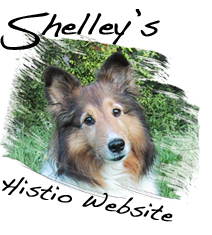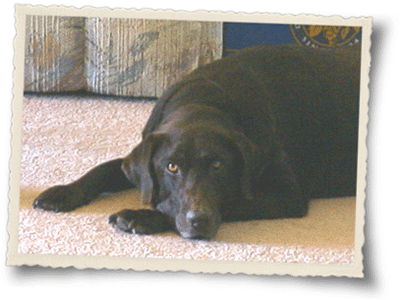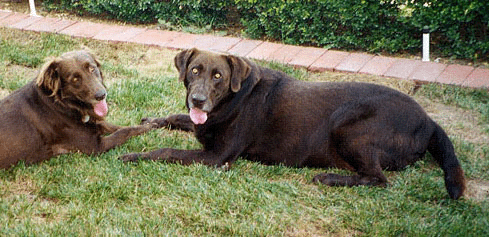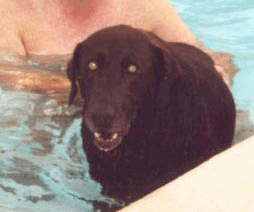
HOME
 YOUR HISTIO STORY
YOUR HISTIO STORY
I am looking for similarities
in all individual cases of
Histiocytic diseases.
I wonder if we all tell our
stories we might come up
with some commonality
between the specific
situations in which all of
our pets got this disease.
So please email me the
details and I'll put your
pets story on Shelley's
Histio Website
 UW HISTIO VERHAAL
UW HISTIO VERHAAL
Ik ben op zoek naar
overeenkomsten in alle
individuele gevallen van
Histiocytose.
Ik hoop dat wanneer wij
onze Histio verhalen
vertellen, wij overeen-
komsten ontdekken over
de manier waarop onze
huisdieren deze ziekte
hebben opgelopen.
Stuur mij de details en
ik zal het verhaal van uw
huisdier op de Histio
website van Shelley zetten.
 WARNING !
WARNING !
These stories are all
different. Individual
symptoms, situations
and circumstances
may vary and response to
therapy is not always the
same.
- Disclaimer -
 WAARSCHUWING !
WAARSCHUWING !
Deze verhalen zijn allemaal
verschillend. Individuele
symptomen, situaties en
omstandigheden kunnen
verschillen en de reactie
op therapie is niet altijd
hetzelfde.
- Disclaimer -
HISTIOCYTOSIS IN
OTHER LANGUAGES
German - Hund
Maligner Histiozytose
French - Chien
l'Histiocytose Maligne
Italian - Canis
Maligni Histiocytosis
Spanish - Perros
Histiocitosis Maligna
Dutch - Hond
Maligne Histiocytose
HOME
Fry
Systemic Histiocytosis
Chocolate Labrador Retriever
Male
January 1, 1993 - September 21, 2002


Story told by Sheila Bowden
The first time I saw Fry he had plopped himself down in my friend Jeannette's backyard and was munching on an avocado. Living in rural southern California and running freely during the day, Fry probably ate 2 to 3 avocados daily, taking them right off the trees there. As a result he was a very large 130 lb. Chocolate Lab. A very handsome, smart, and sweet dog, I fell in love with him almost immediately. He enjoyed lounging on Jeannette's porches, and that is where I interacted with him for a few days every 3 months or so. I wanted to see him more often, but we lived in Tucson, about a seven-hour drive away.
When visiting Jeannette, many times we bathed Fry because he was filthy. There were also times where we found him infested with fleas, ticks, and worms. We spoke to Fry's owners to make sure they were aware of his problems and were later displeased to find that sometimes upon our return months later, these conditions were still untreated. On more than one occasion during a four-year period, we offered to take Fry home with us. Surprisingly, after one visit, his owners called us and were ready to let him go. Fry was having problems with lethargy, a hacking throat cough, spitting up, and arthritis. This was in August of 2000.
When we got Fry home with us, we took him to the vet right away. Over the next four months, he was treated relentlessly for an ear infection, which seemed to be the cause of the hacking cough and spitting up. Finally, we were advised to give him benadryl because the problem did not appear to be just an infection. That seemed to clear up the problem and he continued to get the benadryl nearly daily for the remaining two years of his life.
 Those two years were wonderful! Fry slimmed down with all the good nutrition, exercise, love, and attention he received. He loved to ride around in the back seat of the car while I ran errands. He chased and chased the tennis balls we threw for him, and he was immensely graceful swimming in the pool. He just loved to be with us and we were thrilled to be his family. Fry was about 7 _ years old when he came to live with us. We thought we'd have at least 4 or 5 years to share. That was not to be so. When Fry was about 9 _ years old, he became subdued about a month after we had taken in another older dog. At first, we thought he was just depressed about this intrusion into his life, but became alarmed when about a week later he stopped eating. We took him to the vet right away and many tests were done. It was determined that he was anemic but the cause of the anemia was not apparent. More testing was required. Of course we were concerned, but just knew that we would make sure the vet fixed whatever was wrong. However, after about three weeks of tests, oxyhemoglobin transfusions (man-made blood product) to give him strength, and visits to a veterinary specialist for a bone marrow core sample procedure, we became very worried. Finally, the awful news came that Fry was terminally ill with Histiocytosis and nothing could be done. This disease had invaded his bone marrow and killed the stem cells that produce red blood cells and platelets. Fry could not produce his own blood. My heart stopped. We were horrified and shocked. This could not be true; Fry was so healthy now! He had the best home in the world and the best care possible. He was so sleek and handsome. But we knew that his condition was unstable as he was losing strength daily. We had to take him to the vet every few days for transfusions of oxyhemoglobin, and as his red blood cell count fell (because his body was not producing these cells) he had to receive real canine blood. The real blood made him feel better for a week or so, and we attempted chemotherapy with a very expensive "suspended" drug. A week later, hoping against all odds, we were told that the first chemotherapy treatment had no effect. Repeatedly we were advised to let him go, to euthanize Fry. It was a very difficult time, because other than the anemia, Fry seemed fine. However, we knew when the red blood cell count was low, Fry was forced to breathe faster and faster. This was his body's reaction to the lack of oxygen in his cells due to the shortage of oxygen-carrying red blood cells. After his final blood transfusion, Fry started bleeding internally.
Those two years were wonderful! Fry slimmed down with all the good nutrition, exercise, love, and attention he received. He loved to ride around in the back seat of the car while I ran errands. He chased and chased the tennis balls we threw for him, and he was immensely graceful swimming in the pool. He just loved to be with us and we were thrilled to be his family. Fry was about 7 _ years old when he came to live with us. We thought we'd have at least 4 or 5 years to share. That was not to be so. When Fry was about 9 _ years old, he became subdued about a month after we had taken in another older dog. At first, we thought he was just depressed about this intrusion into his life, but became alarmed when about a week later he stopped eating. We took him to the vet right away and many tests were done. It was determined that he was anemic but the cause of the anemia was not apparent. More testing was required. Of course we were concerned, but just knew that we would make sure the vet fixed whatever was wrong. However, after about three weeks of tests, oxyhemoglobin transfusions (man-made blood product) to give him strength, and visits to a veterinary specialist for a bone marrow core sample procedure, we became very worried. Finally, the awful news came that Fry was terminally ill with Histiocytosis and nothing could be done. This disease had invaded his bone marrow and killed the stem cells that produce red blood cells and platelets. Fry could not produce his own blood. My heart stopped. We were horrified and shocked. This could not be true; Fry was so healthy now! He had the best home in the world and the best care possible. He was so sleek and handsome. But we knew that his condition was unstable as he was losing strength daily. We had to take him to the vet every few days for transfusions of oxyhemoglobin, and as his red blood cell count fell (because his body was not producing these cells) he had to receive real canine blood. The real blood made him feel better for a week or so, and we attempted chemotherapy with a very expensive "suspended" drug. A week later, hoping against all odds, we were told that the first chemotherapy treatment had no effect. Repeatedly we were advised to let him go, to euthanize Fry. It was a very difficult time, because other than the anemia, Fry seemed fine. However, we knew when the red blood cell count was low, Fry was forced to breathe faster and faster. This was his body's reaction to the lack of oxygen in his cells due to the shortage of oxygen-carrying red blood cells. After his final blood transfusion, Fry started bleeding internally.  His platelet count was too low now. At that point, we were sure that we had done everything that we could and we didn't want him to suffer. We were fairly certain that he only had hours to live and we didn't want him to get to the point where he was breathing harder and harder and in discomfort. We had to let him go. Our vet was wonderful to us and to Fry. We both talked to Fry and rubbed him and hugged him during those last moments. He went very peacefully. From the time we first took Fry to the vet to the point of his euthanasia only about 5 weeks had passed. What a terrible nightmare!
His platelet count was too low now. At that point, we were sure that we had done everything that we could and we didn't want him to suffer. We were fairly certain that he only had hours to live and we didn't want him to get to the point where he was breathing harder and harder and in discomfort. We had to let him go. Our vet was wonderful to us and to Fry. We both talked to Fry and rubbed him and hugged him during those last moments. He went very peacefully. From the time we first took Fry to the vet to the point of his euthanasia only about 5 weeks had passed. What a terrible nightmare!
After Fry's passing, I needed to do some research on Histiocytosis. I was so horrified by what had happened, I had to figure out what more we could have done, if anything. Using the Internet along with Fry's medical records, I was able to piece together perhaps what had happened. The records showed that Fry's actual diagnosis was Systemic Histiocytosis. This may start out differently than Malignant Histiocytosis although not much is known. Systemic Histiocytosis is seen in mucous membranes, lymphoid organs, and bone marrow. Some sources indicated that it is a progressive disease that requires continual immunotherapy and can be fatal. Upon finding this information, I wonder if Fry had this disease when we took him home with us and if it was the cause of his ear problems (mucous membranes) and hacking throat problems (again, mucous membranes). Because this is a rare problem, diagnosis would be difficult. Somehow, were we unwittingly able to keep this disease at bay, until it silently crept into his bone marrow and became a malignant problem? Although Fry probably had a genetic pre-disposition to have this disease, I wonder sometimes that if his immune system had been better cared for during most of his life (keeping him free from infestation of fleas, ticks, and worms), would he have had a better chance of not developing Histiocytosis? Of course we don't know, but I can't help thinking that the care Fry received earlier in his life would have had an impact on the later years. I also wonder if adding the new dog to our household was just enough stress to put Fry into a downward spiral health-wise if this Histiocytosis was already lurking within him. Would he still be with us if we had not made this change? We just don't know what would have made a difference. What I do know however is that we are so thankful for the six years that we knew Fry and the wonderful two years we shared. This special relationship changed our lives forever.
Sheila Bowden and Steve Ross

